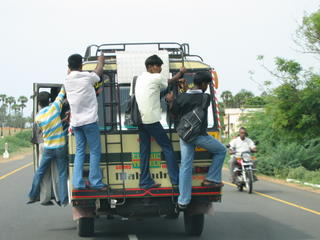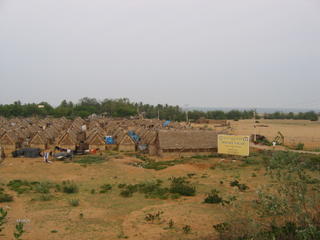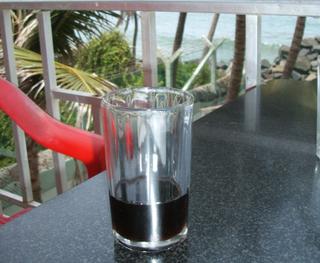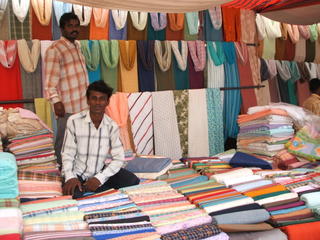Chennai Journal
Sunday, June 26, 2005
Pondicherry

This weekend Marty, Dad and I took a day trip to Pondicherry. It’s about a two hour drive from Chennai and is best done during the day. The East Coast Road that leads from Madras has many twists and turns, and—because not all Indian drivers believe in using headlights—it can be particularly treacherous at night. All along the way you also see police checkpoints, which are designed to deter Madras residents from bringing in cheap alcohol from Pondicherry....as well as scenes like the one above...
The route to Pondicherry covers the coastline that was hardest hit by the tsunami. It’s mostly cleaned up now, but many of the residents are still in temporary shelters. Along the road you can see evidence of both Indian and international response---village restorations with sponsor names from local organizations as well as European and American ones. (Ford has adopted one of these villages, and recently donated 6 fishing boats to help the residents restore their means of livelihood). The Rotary Club that Marty has joined here is sponsoring the restoration of a complete village---housing, schools, hospital, etc. The new village name will be "Rotary Nagar" --Nagar being a Tamil word for town or village.

Pondy, as it’s called by locals, is a former French colony and still the home of the French consulate for southern India. (The French flag flew here during the entire time the rest of India was under British rule). There are supposed to be many good French restaurants, although we made the mistake of eating at a place written up in both a local guidebook and The Lonely Planet called “Seagull”. It had a nice view of the Bay of Bengal but the food was closer to “seagull droppings”, and the wine was of the Magen David variety...
"French wine with a sea view"

Despite disappointment on the culinary front, Pondy is a good place to buy antiques and textiles, and we found one antique shop that had some very nice furniture. Pondicherry is also the home of Sri Aurobindo Ashram, one of the largest in India, with extensive grounds just north of the city. The ashram production, which ranges from exquisite handmade papers, furniture, and clothing to jams and vegetarian cheeses, is also sold in outlets in Pondicherry and Madras called “Auroville.” We came away with two very nice lamps with a Lascaux cave theme, which exactly match a rug we had bought in Detroit.
The ashram also explains the presence of many 60s looking (both in terms of their present age and decade of their youth!) Westerners tooling about in Indian fashion---meaning sans helmet---on motorbikes. The ashram is a great mecca for people studying meditation or yoga, or who just want to hang out in India for a while and do some community service. Given the various production activities at the ashram, which also runs a school for local children, there’s plenty to do. The ashram also has a meditation dome, but to use it visitors are supposed to reserve in advance.
Sunday, June 19, 2005
Internet at Last
At last we have internet at home. We got tired of waiting for broadband (still on order) and so got a wireless card that is a bit slower but still allows us to connect. Still, it was quite a hassle. The store sent Marty home with the card and CD to install, but of course it didn't work. Fortunately the guy they sent to help was very persistent ---almost as if his honor as a techie was at stake. After a couple of hours trying, and even dragging us to a service store with the CD, aircard, and laptop, he finally wound up calling in a friend of his with more experience, and the two of them got it working. Neither would even take a tip.
A few posts back I told you about Cotton City, a kind of street fair of fabrics where I bought the curtain material. Now that we have internet at home, I can post pictures, so here is one:

See anything you like? Well, too bad---this photo was taken in April, and the fabrics change almost weekly, so it probably is no longer available. The last time I took Marty there, they were starting to get in more fall patterns and colors. As expected Marty did not like all the drapes (though he did like some of them) so we'll be doing some replacements in the living room in the next few weeks.
We also had our first "interview" at the Madras Club last week. It was a cocktail reception. Several people were standing around when we got there and we started talking to another couple. Pretty soon a man carrying a white card with some names on it came up and introduced himself as one of the "committee members". He asked who we were, checked our names off, and introduced us to another " committee member." It turned out that we had to meet all 14 committee members as our first formal introduction to the club. After about an hour of this, a gong was sounded. This meant we were free to leave.
I had been warned by one of my co-workers that attending the reception did not mean that membership would immediately follow. This turned out to be correct. The first week in July we have to go a board meeting and have another formal introduction. We are looking forward to it because in addition to having very reasonably priced Western and Indian food and bar, the Madras Club also has a great pool. The paradigm shift is that the pool is not heated but---you guessed it---cooled!
Saturday, June 11, 2005
Servant tales
Leela came back, but only to collect her belongings. Her brother survived the accident, but is still in the hospital with broken bones and a head injury, and will require several months’ care. So she is moving back to Kerala. Before Leela collected her stuff from the servant’s quarters, she picked up and held Junior, who started following her the moment she came into the house. I’m guessing that Junior will be the member of the family Leela misses most.
Leela’s “resignation” solved a problem for us, because the maid that she found for us as a temporary replacement during her absence is far superior to her in both housekeeping and cooking skills. Joyce makes excellent western as well as Indian fare, which is a great relief to Marty, and her cleaning is much more thorough---and regular---than Leela’s. Plus, she is willing to come a full six days a week, whereas Leela had grown accustomed to working for expats who let her have the whole weekend off, largely because they wanted the privacy. Every Thursday or Friday, Leela would start talking about how she needed to leave on Friday night or Saturday morning for one reason or another. Finally, I had a conversation with her about my expectations that she stay through the full day on Saturday, which I could tell did not go down well with her. Though we all liked Leela as a person (and Junior liked her most of all), her quitting was a blessing in disguise.
Our arrangement with Joyce isn’t likely to be permanent, for due to her family situation she is only able to come during the day, not stay overnight, and we’d really like a live-in to provide us more flexibility with Dad. She knows this and since she’d come out of early retirement anyway to help us, it’s not a problem for her. Our neighbors have contracted with a service that provides maid/cook employment to women who would otherwise struggle—women left by their husbands, divorcees, etc. They work all but one day a month and live in---at less than we are paying either Leela or Joyce. We’re going to check them out. (Marty’s torn, though, because he really likes Joyce’s cooking—and she hasn’t made Leela’s mistake of confusing a tin of cat food with tuna fish).
The servant economy here is a whole topic unto itself. Well meaning expats have a tendency to wreak havoc on it. It’s hard for Westerners to fathom, but a salary of $100 per month is a very good working class wage here --- those who work for even wealthy Indians make much less than this. Expats not only have a tendency to pay more than the going rate, but at the merest suggestion from the servant, they throw in extras that no Indian would provide, such as reimbursing transportation to and from work, loans and generous gifts, and shorter working hours. I’m guilty of this myself—remember the loan request from the driver? One of my co-workers told me that some expats continue to send money to their servants after they leave India—one as much as $500 per month!
I understand the psychology that motivates this behavior—a desire to uplift the supposedly downtrodden and the sense that the money is a mere pittance-- but the effect isn’t positive, and we’d be much better served to contribute the money to a local charity that would help the truly unfortunate. For one thing, this largesse encourages the servants to become used to a standard of living that may not be sustained---not unlike the auto worker who upgrades his lifestyle while paid overtime and then suffers when it’s reduced or eliminated. Secondly, it creates expectations that all expats should bestow favors, even when performance hasn’t been proven over time. My driver seemed miffed, for example, because after only two months of working for me, I wouldn’t buy him a new moped to replace the one given by the expat he drove for five years ago (and which I suspect he hadn’t properly maintained). And finally, it spoils the servants to work for a market wage again---some will hold out for months, waiting for another expat, rather than go back to work at the going rate—and also creates resentment among other staff in the neighborhood who make less. Of course, expats are usually also nicer to work for---we say please and thank you a lot more. That part I’m also guilty of, but don’t intend to change.
Monday, June 06, 2005
An event filled week
Well, this week certainly was action packed. For starters, Marty had to go to the hospital. His hip/back pain got worse and worse until finally, on Monday night, the pain became intolerable. He tried to get up about 3 a.m. and could barely put one foot in front of the other. So we called Apollo Hospital and they sent an ambulance with four attendants. (They did not bring the gurney into the apartment but instead carried Marty on a dining room chair to the ambulance, where the gurney finally surfaced.) Slowly --because ambulances here cannot go very fast-- we made our way to the emergency room of Apollo Hospital, which is the leading hospital chain in India. The emergency room was pretty much the same as anywhere else in the world---staffed by interns who don’t have a clue. They did call the orthopedic surgeon who had seen Marty the previous week, and finally decided to admit him.
I had to pay 30,000 rupees upfront (about $700) as an advance against the bill. They handed me a brochure with various room rates ranging from 800 rupees per day ($18) for a ward to over 11,000 ($250) for one called "Executive Suite" and they circled the one called “Single Deluxe” which was 3950 rupees ($90). I said Marty would be just fine to stay in a semi-private room (considering it has TV, bathroom, etc.). Well, of course none were available. He wound up in a room around 3000 rupees that was pretty much comparable to a good hotel---including two extra beds for attendants and family (being a poor nurse, I declined). The nurses were at his every beck and call. He was discharged on Thursday feeling much better. The total bill for a stay of 3 days was 12,500 rupees ($284).
On Sunday morning Leela found out that her brother had been badly hurt in an accident---hit by a lorry (truck to those of you from North America). Although it was difficult to understand her, it sounds like he has closed head injuries. She has gone back to Kerala to be with him and the family. So we have a temporary maid who only comes during the day. Not sure when Leela will be back.

